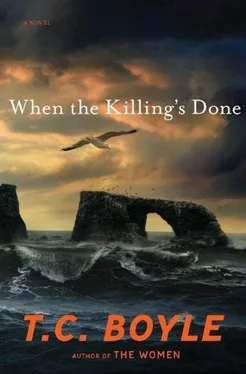From where he sits at the bridge he can see nothing but a rusting heap of old ranch equipment the Park Service dragged down away from the house and left there in the tall weeds above tide line. They’d probably meant to haul it all away, wipe the place clean, but then they would have had to bring a crane out to lift the wreckage onto a barge and transport it back to the coast, so some Park Service genius decided they ought to just leave it there as a curiosity, a historical artifact, a reminder of the times when people like Anise’s mother were out here running sheep. Maybe he can make out something in the pile that might once have been a Jeep, but he’d have to use his imagination to force the lines to coalesce and he’s too busy jumping the binoculars from one point to another, looking for authority figures, for hunters, guns, hounds, helicopters, to pay it more than passing attention.
So he decides to drop anchor and lower the dinghy. What are they going to do — shoot him? He sees nobody, nothing, not a flicker of movement but for the shorebirds doing their thing in quick-footed runnels of color. The outboard fires up right away, a long smooth swell rocking beneath them, and in the next moment they’re planing toward the pier, Anise and her mother riveted ahead, their faces tight with anticipation, and for a moment he sees them both as children, Girl Scouts maybe, and here’s their field trip, their wienie roast and the return of the native all rolled in one. Of course, there’s a sign there, posted on the face of the pier, right where the tourist boat bumps up against the crossbeams to offload, and it tells them what they already know: ISLAND CLOSED TO ALL ACTIVITIES/NO LANDING UNTIL FURTHER NOTICE. BY AUTHORITY OF THE UNITED STATES GOVERNMENT.
But they’re right there now, thirty feet away, Anise demurring—“Maybe we shouldn’t. .”—and her mother, Rita, in a soft coaxing voice, saying, “What’s the harm? I mean, do you hear any gunshots? Do you see anybody? If we could just — I just want to feel the dirt under my feet, that’s all. For five minutes. That’s all I ask.”
And he’s thinking: The sons of bitches . And shoving the tiller to swing the bow abruptly and chase along the beach. Shouting to make himself heard over the noise of the motor, he says, “Maybe if we pull up on the beach we can always say we didn’t see the sign.” Spray shoots up. He eases off on the throttle and then they’re riding the gentle crest of a wave up onto the beach as he tips back the motor and there’s a long shudder and groan of the sand beneath them, everything glinting in the wet, shells, stones, the tiny scrambling things that make their living in the wash.
Rita’s already out of the boat, quick-limbed and agile, tugging at the braided yellow nylon line to pull them up and away from the sea. Anise springs out behind her and now he’s on the beach too, all three of them scooting the inflatable across the sand.
“Wow,” Rita says, hands on her hips, not even winded, “just look at it!” What she’s seeing goes back twenty years and more, but what he’s seeing is the six-foot sign pounded into the sand, a duplicate of the one on the pier, made out of the same sheet metal as a road sign, and before he can register the next one down the beach and the one beyond that he’s wondering if the convicts up at Soledad or wherever had to pound it out in metal shop. Strange twist if they did, forming those proscriptive letters behind bars to keep people out of a place with no bars on it at all.
It is then — Rita exclaiming, Anise following her up the slope toward the house, which is just visible from this angle, some five hundred yards off, adobe, white walls, green tiles anchoring the roof, the sun throwing javelins at everything — that the two jerks in Park Service regalia come hustling out the door. He’s startled, despite himself, because this is just what he expected, isn’t it? His voice is a bark, harsh, snapping like a dog’s. “Anise! Hey, get your ass back in the boat!”
She’s fifty feet ahead of him and her mother’s fifty feet beyond that.
“Rita!” he shouts, and when she turns he stabs a finger in the direction of the men in the distance and then sweeps his arm over his head like a third-base coach waving the runners home. There’s a moment of inaction, Anise’s wide wondering face, her mother’s stacked in duplicate behind hers, and then they’re both running and he’s running too, for the boat, for the line, to haul the thing back in the water and get off before he has to listen to yet another lecture — or worse, go through the whole sick charade of another arrest.
So what is it — a matter of seconds? The rangers, one of them with a mustache, the other without, won’t deign to break into a run because that would somehow impeach their dignity, or that’s how he figures it anyway, but they’re doing double-time nonetheless. For her part, Anise flies. She keeps herself in shape at the club because being fit and looking good are part of who she is and what she does, and here she is beside him, the foam of the surf climbing up their ankles, the dinghy afloat now, the rangers gaining and the sun still throwing spears. The surprise in all this — and how can he examine it so calmly? — is Rita. For the space of a heartbeat he thought she was going to stand there and confront them, lay into them, let them know in the most exacting detail just who she is and what her rights are and how this is her island, not theirs, and if they so much as lay a finger on her the sky will open up and the seas erupt, but he’s managed to trigger the flight response in her and she whips round and bolts for the beach.
The engine catches with an accelerating growl and a quick angry puff of exhaust. Anise is waving her arm like a search and rescue victim. The Park Service types are coming on, stiff-kneed — oh, they won’t run, it’s not in them, because they’re the authority here, the stuff, the man — but Rita never lets them close on her. She can run. For an old woman, or late middle-aged or whatever she is, she’s moving like a well-oiled machine, the cowboy boots — tooled in the pattern of two snakes entwined over the bridge of each foot, red and blue — pounding across the sand and then sloshing through the low wall of the surf, water to her knees, and here she is in the boat and the boat already a hundred feet from shore. Give it some gas, let it ride. He’s breathing hard, the excitement pounding in him like joy, like the very form and definition of it, but the joy comes with an overload of rage and he pins the tiller wide to bring the dinghy back round in a tight arc just as the rangers reach the shoreline and he can see their faces clearly and see that their mouths are open and that they’re shouting something, some official threat or malediction.
Let them. Let them shout all they want. Very slowly, with the greatest deliberation, he raises his right hand, the middle finger extended, just to let them know how he feels.
Dave LaJoy is not the type to give up easily. Or graciously. Or at all. Anise’s mother wants to land, wants to hike around her old property, and that is the issue here. He never stops to think what a shame it is that she didn’t come out on the tourist boat a couple months ago when everybody on God’s green earth was welcome to wander at will and even spend the night in the campground — if they had a tent and a permit, that is — or that she could come out in April or May or anytime but now, because now is when he’s bobbing offshore in the Paladin and now is when he wants access. So what he does, after backing off from Scorpion Beach, hauling the dinghy back aboard and securing it, is head east for San Pedro Point, and the other ranch beyond it, at Smugglers’ Cove.
Anise and her mother are in the cockpit with him, their hands fluttering and mouths going nonstop—“What a rush!” Rita keeps saying and they both break out in laughter — because they’re riding the high of outmaneuvering the Park Service drones, out-foxing them, and how’s that? He doesn’t look back, though he can picture the two figures receding on the beach, maybe wringing their hands and telling each other how unfair the world is. What are they going to do now with their little summons books and their bright shiny new taxpayer-funded handcuffs? He feels for them, he does. But he’s watching out ahead just the same, watching for other boats — for the Coast Guard cutter specifically — because these people do have marine radios, after all. The engine thrums. The weather remains clear. It’s eleven-thirty in the morning and everything’s fine, the cliffs keeping watch on the right, the ocean opening up ahead of them in all its struck-blue empty rolling immensity. “We’re going to try Smugglers’,” he says, and Anise gives him a look.
Читать дальше












